- Home
- Ellen Datlow
When Things Get Dark Page 12
When Things Get Dark Read online
Page 12
Ellie had stowed away her laptop, but her notepad was never far from her hand. She had it open beside her now and jotted down a note: “Feed the hag.”
She startled—and the tail of the g scritched off jaggedly—when her husband again called her name.
“What?”
“Have you heard anything I said?”
She crossed out what she had written. “I’m sorry. I just—I’m going to take a few days to chase a story. Is that okay?”
“It’s getting close to Christmas,” he said.
“I’ll obviously be back before then. Obviously.”
He didn’t say anything. He only wiped his mouth and stood to clear his dishes.
Lyra jogged her eyes between them, and when Ron marched away to the kitchen to scrape the leftovers into a Tupperware container, she said, “Don’t go. Please. I hate it when you go.”
“I have to. For work.”
“But all you do is work.”
“Yes,” Ron said from the kitchen. “All she does is work.”
“Finish up, okay?” Ellie said, neglecting her own unfinished plate, standing and retreating to the bedroom.
She closed the door behind her and walked immediately to her bureau, the top of which was a clutter of perfume bottles and scarves and jewelry and medicine bottles. She found her prescription for Lorazepam. She strangled off the cap and dry-swallowed a pill.
She stared at herself in the mirror for a long minute before opening up a polished wooden jewelry box. She pulled open its bottom drawer and pushed past the bracelets and necklaces and watches until she found what she was looking for, dusty and unseen after so many years.
A carved totem. In the shape of a nightmarish gull.
* * *
The girl in the yellow dress wore a blindfold when she stumbled through the woods. She took high steps to avoid tripping. Her hands were out before her, feeling the air, as if her fingers were worms struggling through the dark. Her shoe caught on a stone. Her shin bashed against a log. But she wasn’t afraid. Giggles punctuated her words when she called out, “Ten… nine … eight… seven… six…”
Though she couldn’t see the pines and hemlocks and tamarack around her, they were cloaked in a fog that swirled in her wake. The ground was moist with it, the rocks slick. And the moisture in the air carried sound strangely. A gull cried and a tree creaked and a stick snapped and her voice called out its countdown and everything sounded both faraway and dangerously near.
The other girl was up ahead. She did not wear a blindfold, so moved much more swiftly, kicking through bracken that dampened her jeans with dew. She leaped over a moss-furred log. She made it almost to the ruins up ahead—the stony ruins of the first settlers on the island— when the voice behind her finally called out, “One!”
Now the girl stopped, rooted in place. And began to count aloud herself, despite her panting breath. Because these were the rules of the game. An old game of tag called Hunter/Hunted, similar to Marco Polo. “Ten… nine… eight… seven… six…” she began and watched, in the near distance, as the blindfolded girl in the yellow dress tripped and shuffled toward the sound of her. “I’m going to get you,” she said, laughing. “I’m getting closer!”
Back and forth they went with their countdowns, with their halting pursuit and escape, until the leader among them, the hunted, rushed out of the woods and onto a basalt ridge. The hush of the forest gave way to the shush and boom of the ocean.
Before her was a peculiar landmark, known by the locals as the Witch’s Cauldron. A ringed and recessed section of shoreline that looked exactly like its name. At high tide, the sea came crashing through an eroded arch and into this basin, frothing and surging, rising up into a boiling mass of water. The cauldron was thirty feet wide and just as deep.
The girl in the jeans only hesitated a moment, because a voice could be heard behind her, yelling, “Five… four… three…”
She scrambled out onto the rim of the Witch’s Cauldron, sometimes upright, sometimes on all fours, crabbing her way to its far side. The blindfolded girl on the shoreside of the ringed gap cried out, “Hello? Are you there? You’re supposed to be counting.”
For a moment there was only the crash and salt spray of waves, and then the girl began her countdown once more, beckoning the blindfolded girl forward.
“Ten… nine… eight… seven… six…”
And the blindfolded girl marched toward her, seeking her voice, with the mouth of the Witch’s Cauldron gaping only a few steps before her.
* * *
The ferry was rust-pocked and mildew-stained. The small garage in its belly was empty except for one other car. Ellie walked to the deck to take in the blustery view. She pulled on a wool cap and zipped her jacket to her neck and tucked her hands into mittens.
The sky was the same concrete gray as the ocean. Rain-misted. The air tasted like aspirin. The ferry chugged through waves that rose and dipped. She walked slow laps around the deck. After thirty minutes, the tree-studded, fog-cloaked island was visible in the distance, like a castle with a boundless moat.
Two months ago, the sun would be burning down and the ferry would have run several times a day, jammed with tourists in white tennis shoes. But this was December, and now the ferry only ran in the late morning, so she didn’t have to jostle anyone for the bow of the ship.
She leaned over the railing to take in the chop. Something caught her eye. A flash in the murk. The smear of a pale face staring horribly up at her.
She pulled back and counted to ten, then looked again and saw only the cold nowhere of the sea. The ferry blew its horn, the air throbbing with its bass. She could see lobster boats chugging through the water. The wharf that awaited them and the dark-windowed buildings squatting beyond it.
She returned to her car and tucked herself into her seat and dug around in her purse until she found the bottle of Lorazepam. She shook out another pill, swallowing it down with a gulp of cold coffee.
She blew out a sigh—and reached for the rearview mirror to check her makeup. But when she readjusted it, a face curtained with hair appeared behind her.
She screamed and the face in the mirror screamed too. The high-pitched yelp of a girl. Her daughter, Lyra.
* * *
Ellie drove off the ferry and parked in the first spot she could find beside the wharf. Boats bobbed in the water when she said, “Will you please stop crying?” and dug out her phone.
She always kept her cell on mute. She couldn’t stand the constant distraction of calls and texts and notifications. When she checked it, the screen brightened with voicemails and messages from Ron. All about how he couldn’t find their daughter.
“That’s because she’s sobbing in the back seat,” she said through her teeth. And then, louder, “Lyra! Stop! That’s enough!”
Her daughter was curled up in a ball, her face red and damp with tears, her breath hitching when she said, “But you’re mad at me.”
“Just because I’m angry doesn’t mean I don’t love you.” The cabin of the car amplified all sound and made her head feel too full of noise. “Now stop crying! Please!” This she said at a shout, and it only made Lyra wail louder.
A white splat of bird shit hit the windshield as a gull swooped past. Ellie closed her eyes and took a deep shuddering breath. She quieted her voice when she said, “Hey. Hey, Lyra. Come up here. It’s okay. Climb up in the front seat by Mommy.”
The girl’s cries lowered to a whimper. With her sleeve she wiped away a slug of snot. Then she clambered over the console and into Ellie’s lap. “It’s all right. It’s okay.”
“I just,” Lyra said. “I just wanted to spend time with you.”
“I know, I know.” She combed her fingers through her daughter’s tangled hair and kissed the crown of her head. Another gull swooped past the car and distracted her gaze. Her eyes focused on a figure in the middle distance. Big and box-shaped. A long silvering beard that looked like something washed in with the tide. His face was so
deeply creased it appeared scarred. He wore black bibs and a gray wool sweater. He was in the process of docking his boat. He swung a leg over the gunwale, a coil of rope in hand. He knotted it swiftly around a cleat. It was difficult to tell from here, but his hands appeared gloved in blood.
“I’m going to call Daddy, okay? Because I’m sure he’s worried about you.”
She kept one arm curled around the girl, while the other brought the cell to her ear. The signal was weak, and it took some time before they were connected. His panicked voice said, “Please tell me she’s with you?”
“Stowed away in the back seat.”
He blew out a heavy sigh. “I was this close to calling the police.”
“If I put her back on the ferry, will you be there to pick her up?”
“What?” he said, his relief giving way to anger. “That’s a two-hour drive. I can’t believe you’re even asking me that.”
“I’m on assignment. How am I supposed to work?”
The man with the silver beard dragged a shark out of his boat. It left a blood trail on the rough brown planks of the docks. He approached a hitching post with oversized hooks hanging from it. He hoisted the fish and hung it from its gills. Some gulls dropped down—called by the blood—and roosted nearby, hoping the guts might get tossed aside.
“Ron?” she said. “What am I supposed to do?”
“Try being a mother,” he said.
For a moment she believed the call cancelled, but then his voice, softer than before, said, “I’m sorry. But I have to work too. Can it wait until tomorrow?”
“If it has to.”
“It has to.”
“The morning ferry,” she said. “Be there.”
From his belt the man with the silver beard withdrew a filet knife that flashed silver. He jammed the blade into the shark, prodding the anus and then ripping upward, unzipping its belly. He reached his hands into the gap. He withdrew a sodden mess of what looked like hair jeweled with teeth. He sniffed at it before heaving it aside with a splat.
The gulls descended to feast.
* * *
The fog poured off the ocean like a second tide out of rhythm with the noise of the crashing waves. On the coastal side of the Witch’s Cauldron stood a girl, counting down, “Five… four… three…”
Inside the formation, the sea foamed and whirled. Toward it walked the girl in the yellow dress. Blindfolded, her arms out before her, hurrying along a little faster as the countdown neared its end.
“Two…”
But the other girl never yelled out, “One!” Maybe she was afraid to. Or maybe she was hoping to draw her pursuer a few more paces.
Then the girl in the yellow dress tripped, fell hard to her knees, only a foot from the drop.
She cried out in pain and nudged off her blindfold, but any injury she felt was soon forgotten when she saw the cauldron yawning before her—and the girl on the other side of it, staring miserably back at her.
* * *
There were two parts of Gull Island. The wild place studded with evergreens and knuckled with rocky ridges and creamed over with fog. And the domesticated face of it. Which was mostly clustered along the western shore.
Here, along a single street, stood a cedar-shingled inn, a small brick library, a chowder house, an ice cream shop, a mercantile and knick-knack shop, a tavern called The Lonely Gull, and a seafood shack called The Lobster Pot.
They were all shuttered or posted signs for reduced hours. Because the tourist season was long over. These were the thin times. A tiny windmill turned slowly and creakily at the mildew-spotted miniature golf course. A rusted collection of rental scooters and bikes had been left out like abandoned toys.
In The Lonely Gull, an old man in a flannel jacket hunched over the bar, nursing his beer, while the jukebox played the same song over and over, and on the beach there was a single set of footprints bothering the gray-black sand.
Ellie and Lyra took all of this in as they walked the town and poked their heads in and out of buildings. They desperately wanted a cup of cocoa but the best they could find was a dry-mix packet for sale at the mercantile. They bought it, along with some black-spotted bananas, a bag of bread, and a faded box of granola bars.
The man behind the register had only a few hairs on his head and wore a denim shirt and glasses with thick, yellowed lenses. A fly swatter hung on a nail behind him. He did not greet them when he rang up the order. He paused his hand on the granola bars when she said, “Funny question, but do you know of any missing persons cases? Here on Gull Island?”
“I’m sorry?” he said in a reedy voice.
“Has anyone gone missing here?”
“That is a funny question.”
“I just—you know how unreliable memory can be—I seem to remember a news report from back when I was a kid? About a missing girl? Or a drowned girl? Or maybe I’m misremembering.”
“A missing girl, you say?”
“Yeah. Maybe twenty-five years ago?”
“Twenty-five…” His lower lip quivered. “I don’t remember anything about that.”
“Just curious. Who has police jurisdiction here?”
“There’s no police here.”
“But if there was a problem, who would you go to?”
“There’s Thatcher,” the clerk said and finished totaling up the cost.
“Who’s Thatcher?” she said and counted out some bills and change.
“Works a lobster boat. But he’s our constable.”
“Is he a big old guy? With a gray beard?”
“That’s the very one.”
She thanked him as he bagged up their food. From here they traveled to the inn, walking down the middle of the street, because there was no traffic. The blacktop was spotted white from the gulls. Feathers swirled and revealed the shape of the wind. A face peered out of a foggy window and she remembered the face staring out of the water.
“You know I came here once,” Ellie said, “when I was your age. On vacation.”
“Was it fun?” the girl asked and Ellie took a long time to give a hollow-voiced answer. “No.”
“Then why did you come back?”
“Because I think there might be a story here.”
“A funny story? I like those the best.”
“No.”
“A scary story?”
Ellie did not answer and her daughter said, “I don’t like scary stories.”
* * *
Though it was December, there were no wreaths or sleigh bells or menorahs anywhere. Instead, strange decorations hung from porches and dangled in windows and spiked the hillside and beaches. They were gulls. Carved wooden gulls. Some were as small as a brooch, others were as big as a man. All were of a similar design, with their eyes wide, their beaks open, their wings outstretched.
Such an ornament hung in the inn—near the reception desk, on the wall, like a crucifix. “I don’t have a reservation,” Ellie said. “I hope you have a room for us?”
The old woman behind the desk coughed out a laugh. Her breath smelled like the ghosts of a thousand cigarettes. “That’s funny.” She motioned a hand at the cabinet behind her. In every cubby hung a brass key. “Nothing but room here.”
Her eyes were milky. She wore a cardigan sweater over a dress with anchors printed on it. She moved slowly, as if her joints were full of rust, when she hefted the ledger onto the counter with a thump and asked Ellie to fill it out.
“How many people live here?”
“Well, there’s the people who own houses here, and then there’s the people who live here. You see a big house? That belongs to someone who vacations here or rents out to tourists. You see a fish shack or an apartment over a shop? That’s the rest of us.”
“Year-round residents,” Ellie said. “That’s what I meant.”
“Few dozen. Housekeepers. Bartenders. Cooks. Fishermen.” The old woman smiled and showed off a gap in her yellowing smile. “Servants.”
“It’s so
quiet here now.”
“Thin,” the old woman said. “Things get thin here in the winter.”
Footsteps thumped down the stairs, and a woman appeared carrying a bucket of cleaning supplies. She had no eyebrows. She wore a paisley scarf on her head and her skin had gone the thin yellow of old paper. Maybe she was in her thirties, maybe her fifties; it was hard to tell. She stared at them without a hello and then disappeared through a door that flashed a glimpse of the kitchen.
“Thin,” the old woman said again.
Ellie offered a credit card and the old woman ran it through an old flat-bed imprinter and had her sign the carbon paper. “Haven’t seen one of these in a while,” Ellie said, and the old woman said, “Sometimes the old ways are best.”
Lyra stood beneath the gull hanging on the wall. It was nearly as big as her, anchored by big screws that fissured the wood. She ran her fingers along the detailed ridges etched into its claws. “Don’t touch that, sweetie,” Ellie said and the girl pulled back her hand as if burned.
“It’s all right,” the old woman said. “It’s pretty, isn’t it?”
“It’s kinda pretty but kinda also freaky,” Lyra said.
“Can you tell me about that carving?” Ellie said. “I noticed quite a few of them decorating the storefronts.”
“Oh, it’s an old pagan tradition here. Connected to the winter solstice.”
“The solstice. On the twenty-first.”
“Two more days.” The old woman winked. “Not everyone who came across the Atlantic was a Puritan, you know.”
“Mommy’s a writer,” Lyra said, followed by an “Ow!” and it was only then that Ellie realized she was digging her fingers into her daughter’s shoulder.
“A writer?” the old woman said.
Ellie’s words came out in a quick tumble. “I never really get a vacation. Always on deadline, you know. So I thought I’d get away. Do a touch of work. But mostly get away.” She tried to neaten her daughter’s hair and then gave up. “We’ll get some quality time in—right, Lyra?”

 Inferno
Inferno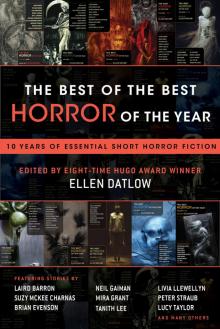 The Best of the Best Horror of the Year
The Best of the Best Horror of the Year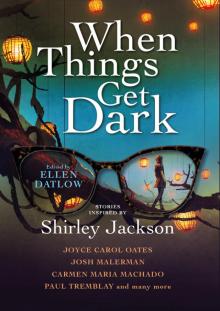 When Things Get Dark
When Things Get Dark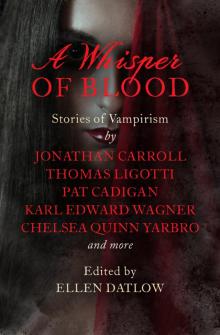 A Whisper of Blood
A Whisper of Blood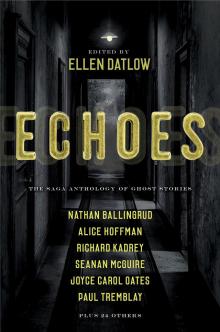 Echoes
Echoes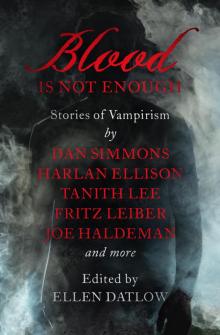 Blood Is Not Enough
Blood Is Not Enough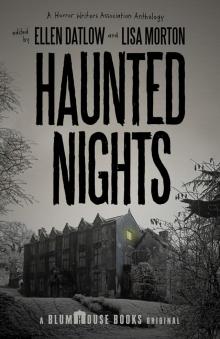 Haunted Nights
Haunted Nights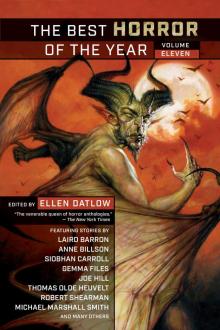 The Best Horror of the Year Volume Eleven
The Best Horror of the Year Volume Eleven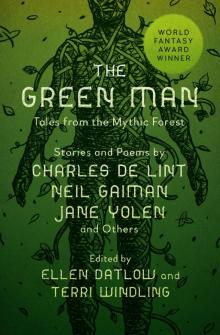 The Green Man
The Green Man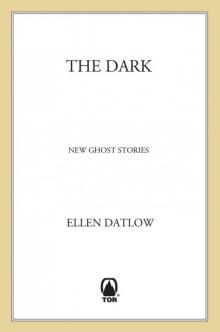 The Dark
The Dark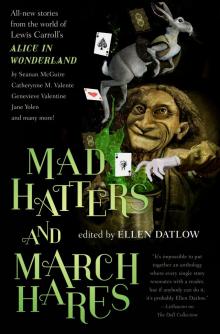 Mad Hatters and March Hares
Mad Hatters and March Hares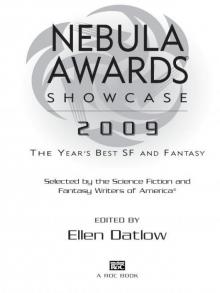 Nebula Awards Showcase 2009
Nebula Awards Showcase 2009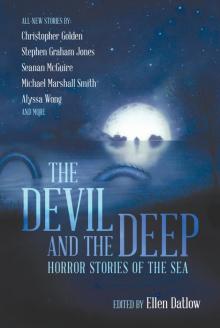 The Devil and the Deep
The Devil and the Deep